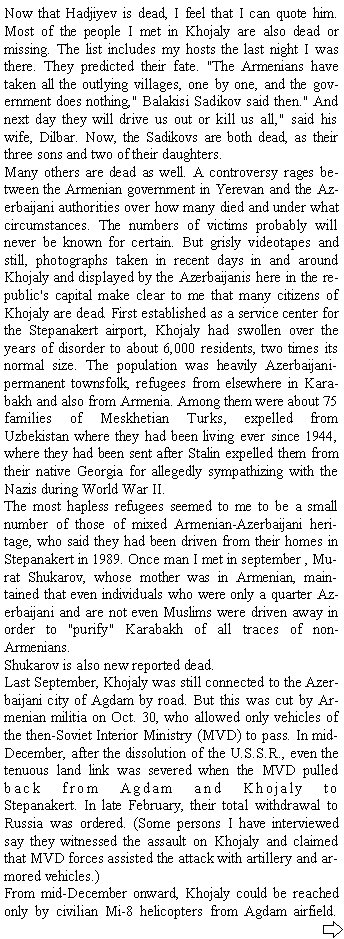|
From The Washington Post
A Town Betrayed - By Thomas Goltz
March 8,1992
Baku. Until two weeks ago, Khojaly was just another rundown town on the globe, hardly worth a second look from anyone. Khojaly had one distinguishing mark: It was a community where Azerbaijani Muslims lived
inside the enclave known as Nagorno-Karabakh, whose Christian Armenian majority wants to secede from Azerbaijan, which holds administrative control.
Now Khojaly is notorious. During a paramilitary assault by Armenians that began on Feb. 25, many from the town were killed, and the world has taken a second look at Khojaly. Much has been reported about what happened, much that is contradictory. Perhaps, no clear portrait of what happened will ever emerge. But let me tell you what I know about Khojaly. I went there twice before the events on Feb. 25-26-once last September, and again in January, I talked with dozens of people. I found the towns folk preoccupied with fear that death was closing in on them- and they had no exit. Khojaly sprawls on the plain between the eastern tip of the Karabakh mountains and the capital, Stepanakert. It controls access to the troubled enclave's airport.
Khojaly is not a real "town" so much as a series of neighborhoods, defined by mud or gravel roads cutting between clusters of two-story houses with privies set in little back gardens. A small river and shallow canals meandered through it. I remember flocks or waddling white geese, but no trees.
"Downtown" was a few unstocked shops and four plain, unattractive local government buildings with outdoor wells. Last September, construction work was in progress. But when I went back two months ago, all work had stopped: There were no bricks, or mortar or faith in the future to keep building.
By day, people just stood in small knots in the muddy lanes-waiting. By night, thy huddled around guttering candles in their houses, listening to the gunfire in the dark as a garrison of 63 security men tries to hold Khojaly's sprawling periphery while Armenian militia crept ever closer.
The residents and the security men had one common thought: They felt they were doomed, and spoke openly of it. " It is the (Azerbaijani) government, " Alef Hadjiyev, the de facto commander of the town's defenders, told me in January:" Baku (the republic's capital) could solve this business in five days if it wanted to, but the old communist mafia just wants it to go on and on whole they loot the country. If you write that and attribute it to me, I will deny it. But it is true."
|
|
